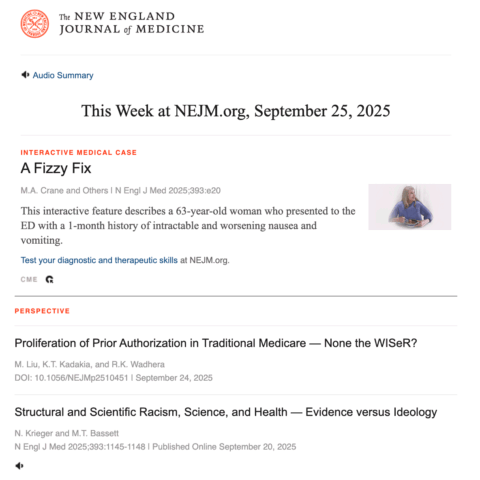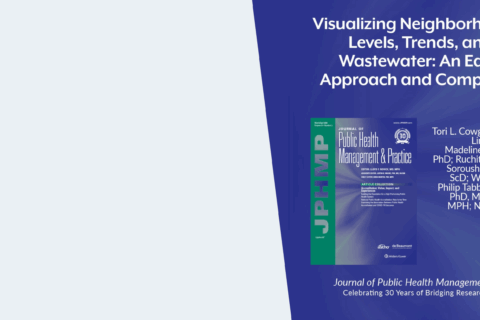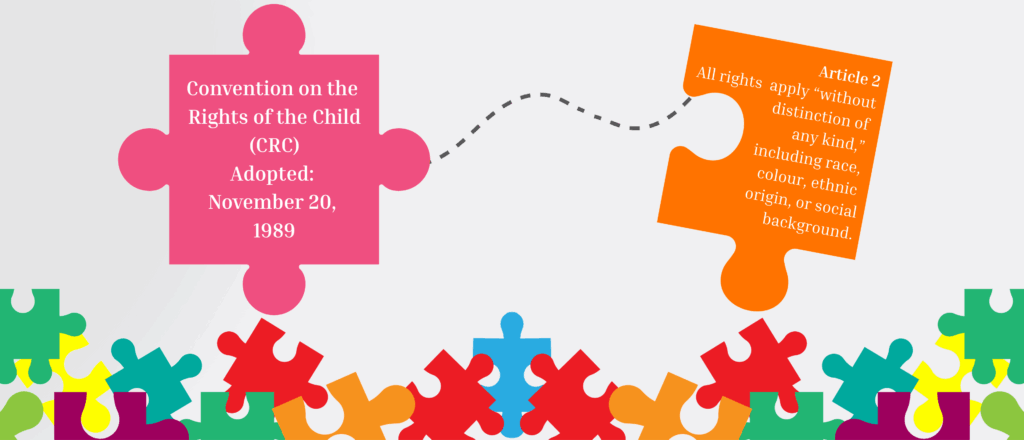Racial Justice Program
Hero Pagination
About the program
The Convention on the Rights of the Child (CRC), which was adopted by the United Nations General Assembly resolution 44/25 on November 20, 1989, serve as a crosscutting framework for our work. Article 2 is of particular relevance to FXB’s Racial Justice Program:
Supporting Antiracist Research Centers for Health
Confronting these challenges requires rigorous, community-engaged research and a commitment to translating knowledge into actionable solutions. Further, advancing health equity depends on cultivating a new, more diverse generation of health researchers and practitioners, supporting innovative leaders at all levels, and ensuring scholarship is directly informed by those most affected by inequities.
This project, funded by the Robert Wood Johnson Foundation, enables the FXB Center to convene and nurture innovative leaders at every career stage, including emerging scholars and graduate students, while building deep, accountable relationships with the communities most affected by health inequities. We aim to produce scholarship and actions that are intellectually robust and responsive to the lived realities and wisdom of those on the front lines of justice work.
Four interconnected projects collectively advance research and community partnerships to address the health impacts of structural racism.
Three of these are research-based initiatives: one investigates how human and algorithmic bias shape clinical decision-making and healthcare systems, with the goal of dismantling race-based medical practices and promoting more equitable models of care. A second examines how intersecting systems of racism, patriarchy, and capitalism contribute to maternal health disparities among Black women, using qualitative research and community partnerships to inform advocacy and policy aimed at reducing stress-related pregnancy complications. A third studies how structural racism and healthcare financialization produce healthcare “deserts” and unequal access in historically Black neighborhoods, generating empirical evidence and community-driven recommendations for policy change.
The fourth project strengthens a community-based doctoral internship program that places students with grassroots organizations advancing racial health equity, providing direct financial support to both students and host organizations while fostering accountable, mutually beneficial academic–community collaboration.
Together, these projects advance rigorous, community-rooted scholarship to support racial justice and health equity.
Listen to former FXB Director Mary T. Bassett, MD, MPH discuss how racial and social disparities put certain groups at higher risk for COVID-19:
Featured publication

Meet the Principal Investigator
Meet the Research Scientist and Research Associate
Meet the Research Advisors
Community-based Internship Placements
Community-based internship placements are a component of the FXB Center’s Supporting Antiracist Research Centers for Health program designed to build, strengthen, and sustain our relationships with communities working to address structural racism in health. Through these internships, we place doctoral students in community-driven projects focused on combating the various ways structural racism impacts health.
We prioritize partnerships with grassroots community-based organizations and community-based groups in the Greater Boston area, while also collaborating with a diverse range of organizations, including national advocacy groups and local public health departments. This internship opportunity provides students with hands-on experience in community-engaged practice while contributing to meaningful, community-led efforts toward racial and social justice.
Since 2019, the FXB Center has helped place and support PhD students in organizations that work to serve children’s needs such as:
- Friends of the Children-Boston: The internship was created to serve Friends of the Children by developing a mental health needs assessment and program design for children to address the need for psychosocial and academic support during the pandemic.
- Neighborhood Birth Center (NBC): The Neighborhood Birth Center (NBC) in Boston is working to develop a sustainable nonprofit community birth center model given that birth centers currently face a wide array of policy barriers and thus often rely on personal financing from midwives to operate.
- Somali Parents Advocacy Center for Education (SPACE): The project involved conducting research to understand how well Somali families in the Greater Boston area comprehend their child’s abilities in the context of the new Individualized Education Program (IEP) forms.
- Citizens for Juvenile Justice: This research project aimed to document and support the delivery of high-quality, age, gender and culturally appropriate healthcare for children in criminal justice detention globally.
- New England Pediatric Environmental Health Specialty Unit (PEHSU): The mission of this non-profit is to address the community’s needs through providing medical services, advice, and educating the community on environmental conditions that influence reproductive and children’s health. The project helped build capacity and spur efforts related to community collaboration, education, outreach, and advocacy through the lens of environmental justice (e.g. youth programming, mobile medical services).
- Resilient Sisterhood Project: The project involved a literature review focused on the structural drivers of early puberty which disproportionately impact Black girls. This research will support future programming focused on education and resources surrounding this inequity.
- Boston Public Health Commission (BPHC): Projects included a five-session Farm to Early Care and Education (Farm to ECE) Learning Collaborative for early childcare educators to promote young children’s healthy eating and access to fresh local produce through an interactive educator training.
Making the Public Health Case for Reparations
Principal Investigator and Co-Principal Investigator
Meet the team
Landscape Report
Note: The landscape of efforts to address reparations has been changing with time. This report reflects efforts prior to 2023.
In February 2022, the FXB Center released “Making the Public Health Case for Reparations: Landscape Report,” a first-of-its-kind report on reparations for Black Americans. The report considers whether longstanding racial health inequities could be mitigated by reparations efforts with the goal of engaging more health scholars in this conversation. Read the report.
Summary of National Efforts
From a national lens, several U.S. jurisdictions have taken the initiative to model reparation efforts, which includes: Asheville, North Carolina; Durham, North Carolina; Evanston, Illinois; and the state of California. In addition, Mayors Organized for Reparations and Equity (MORE) includes 11 mayors in cities across America with shared justice commitments and strategies to fund pilot programs for reparations.
Leading with the most progress in reparation efforts, Evanston, Illinois has been the first and only city to repay its Black residents with cash payments. Its $25,000 payments can only be utilized for home infrastructure and will be given to 16 Black residents of its 12,000 in total. The payments will be the pilot steps in the pledge to allocate $10 million over the next 10 years.
The MORE coalition was formed in anticipation of the declaration of Juneteenth as a federal holiday and includes cities within California, Oklahoma, North Carolina, Rhode Island, Texas, Missouri, Colorado, and Minnesota. The coalition has shared commitments that aim at locating funding for pilot reparation programs, creating Black-led advisory committees, and urging the federal government to pass H.R. 40 (Commission to Study and Develop Reparation Proposals for African-Americans Act).
For a handful of these cities—Los Angeles, Austin, Durham, Asheville, and Providence—efforts are focused on studying their individual injustices of the past upon their residents. However, none of the cities have progressed far enough to solidify a specific spending budget on reparations. Overall, most of these cities have not decided what subset of the population will receive reparations or what form it may be. Accordingly, the nation’s overall progress towards reparations can be described as in its infancy stages. The next steps, after conducting studies, appear to be locating funding for pilot reparation programs and deciding which residents will benefit from a specific reparations form.
Related Work
Note: This work is not supported by the Making the Public Health Case for Reparations project.
Watch a short animation on reparations and health here.
Past Events
November 3, 2022 – Can Reparations Close the Racial Health Gap? In partnership with Harvard Public Health magazine, the FXB Center for Health and Human Rights hosted a free, in-person symposium at Harvard University’s Martin Center examining the persistent toll of anti-Black racism and avenues for redress. Take a look at Symposium highlights here.
Further Racial Justice Work
Racial Justice Program Recent Publications
Disability inclusion in health data systems and policy in Korea: Time for action, Health Affairs Scholar, January 20, Ichiro Kawachi (Co-Author)
Routine health checkups and cognitive resilience among older survivors of the 2011 Japan Tsunami, npj Natural Hazards, January 9, Ichiro Kawachi (Co-Author)
Interpersonal conflicts, social media use and depression associated with protests, Nature Medicine, January 6, Ichiro Kawachi (Co-Author)
Tariffs and economic uncertainty threaten public health, Nature Human Behavior, January 2, Ichiro Kawachi (Co-Author)
Dyadic Associations of Depressive Symptoms and Cardiovascular Health in Middle-Aged and Older Couples, Innovation in Aging, December 31, Ichiro Kawachi (Co-Author)
Unhealthy behaviours in disaster survivors are associated with scarcity and present bias, Communications Psychology, November 24, Ichiro Kawachi (Co-Author)
Midlife in the United States (MIDUS Refresher 2): Milwaukee African American Sample, 2023-2024 (ICPSR 39583), Inter-university Consortium for Political and Social Research, November 19, David R. Williams (Co-Principal Investigator)
Leading causes of death rankings among U.S. adolescents by race and ethnicity: A comparison of two classification schemes, SSM-Population Health, November 15, Ichiro Kawachi (Co-Author)
Diverging global incidence trends of early-onset cancers: comparisons with incidence trends of later-onset cancers and mortality trends of early-onset cancers, Military Medical Research, November 14, Ichiro Kawachi (Co-Author)
Psychological distress and subjective health status of adolescents living with a sibling with care needs: a population-based study, Environmental Health and Preventive Medicine, November 12, Ichiro Kawachi (Co-Author)
Socioeconomic disparities in in-hospital mortality and 30-day hospital readmission rates among people with eating disorders: a retrospective cohort study, Journal of Eating Disorders, October 29, Ichiro Kawachi (Co-Author)
Anti-Racist Practices in Health Care Organizations—A Qualitative Analysis, International Journal of Environmental Research and Public Health, October 28, David R. Williams (Co-Author)
Childhood SES gradients in adult functional limitations: Does state-level macro-economic context matter?, Social Science & Medicine, October 11, Ichiro Kawachi (Co-Author)
Funding and Defunding of NIH Research Should Be Based onReal Science and NotPolitics or Amorphous Constructs, American Journal of Public Health, October 9, David R. Williams (Co-Author)
Changes in inpatient and outpatient stroke admissions during COVID-19: a difference-in-differences analysis based on claims data from 242 acute care hospitals in Japan, BMJ Public Health, September 29, Ichiro Kawachi (Co-Author)
A review of the impact of structural racism on lived experiences of adolescents of African descent: Implications for development, brain structure, and health, Neuropsychopharmacology, September 26, David R. Williams (Co-Author)
Impact of Telemedicine on Health Expenditures During the COVID-19 Pandemic in Japan: Quasi-Experimental Study, Journal of Medical Internet Research, September 23, Ichiro Kawachi (Co-Author)
Structural and Scientific Racism, Science, and Health — Evidence versus Ideology, The New England Journal of Medicine, September 20, Nancy Krieger and Mary T. Bassett (Co-Authors)
Physical Activity and Stroke Incidence Among Post-Menopausal Women: Insights from the Women’s Health Initiative, Neuroepidemiology, September 18, Monik C. Botero (Co-Author)
Solitary confinement and post-release drug and alcohol test failure among formerly incarcerated men on parole in Pennsylvania (2010–2023), International Journal of Drug Policy, September 18, Jaquelyn L. Jahn (Co-Author)
Global Trends and Disparities in Social Isolation, JAMA Network Open, September 15, Ichiro Kawachi (Co-Author)
Community Connectedness as a Source of Adherence to HIV Prevention Behaviors and Resilience Among Transgender Women of Color in New York City, 2020–2022, American Journal of Public Health, September 10, Ichiro Kawachi (Co-Author)
Childhood neglect and adult mental disorders: A sibling-comparison study, Journal of Affective Disorders, September 4, Ichiro Kawachi (Co-Author)
Relative deprivation and subsequent health, happiness, and human flourishing: A longitudinal outcome-wide analysis, Social Science & Medicine, September 4, Ichiro Kawachi (Co-Author)
A latent measure of cultural racism and its association with US mortality and life expectancy, Nature Human Behavior, August 26, Nancy Krieger (Co-Author)
On the passage of US legislation cutting Medicaid: a missive from the “safety net”, The Lancet Regional Health – Americas, July 25, Margaret M. Sullivan (Author)
Positive and Negative Family Relationships Correlate With Mental Health Conditions -a Systematic Review and Meta-Analysis, Public Health Review, July 21, Ichiro Kawachi (Co-Author)
Occupational Disparities in Cancer Survival Among the Working Population in Japan: 10‐Year Survival Analysis Using the Kanagawa Cancer Registry, Cancer Medicine, July 3, Ichiro Kawachi (Co-Author)
Advancing health equity in wastewater-based epidemiology: A global critical review and conceptual framework, SSM – Population Health, June 2025, Soroush Moallef, Ruchita Balasubramanian, Nancy Krieger, Mary T. Bassett, Tori L. Cowger (Co-Authors)
Global Incidence Trend of Early-Onset Obesity-Related and Non-Obesity-Related Cancers, Current Oncology, May 31, Ichiro Kawachi (Co-Author)
Context matters: Validity and reliability of a sociopolitical concerns measure for use in population health research on discrimination and health, Annals of Epidemiology, May 26, Dougie Zubizarreta, Nancy Krieger (Co-Authors)
Correlates of longitudinal patterns of racial discrimination in midlife and older Black adults: Evidence from the health and retirement study, Social Science & Medicine, May 24, David R. Williams (Co-Author)
Race, discrimination, and mental health adversity in Canada, Canadian Journal of Public Health, May 21, David R. Williams (Co-Author)
The Association Between Perceived Stress and Insomnia Among Asian Americans, Sleep, May 19, Ichiro Kawachi (Co-Author)
The potential impact of the Trump administration policies on health research in the USA, The Lancet, May 16, David R. Williams (Co-Author)
Neighborhood Threat of Eviction over Time and Risk of Preterm Birth in Black American Women, Journal of Racial and Ethnic Health Disparities, May 13, Brittney Francis (Co-Author)
Racial Justice Program Recent Press
Challenging The Administration’s Weaponized And Lethal “Gold Standard Science” (Nancy Krieger authored, Health Affairs Forefront, November 18, 2025)
Opinion: Health equity research is evidence-based, helps everyone thrive (Nancy Krieger and Mary T. Bassett quoted, Harvard T.H. Chan School of Public Health News, September 29, 2025)
NIH director Bhattacharya’s views on health disparities contradict, experts say (Mary T. Bassett and Nancy Krieger quoted, Harvard T.H. Chan School of Public Health News, August 7, 2025)
Rethinking How to Evaluate Impact: New Scale Measures Agricultural Community Power (Tori Cowger mentioned, Drexel Dornsife School of Public Health News, May 7, 2025)
What’s lost when federal funding for research is abruptly terminated (Nancy Krieger quoted, Harvard T.H. Chan School of Public Health News, April 24, 2025)
Doctoral students awarded stipends for social equity, health equity projects (Dougie Zubizarreta, Jasmine Graves, Taylor Robinson, Mai-Han Trinh, Artair Rogers mentioned, Harvard T.H. Chan School of Public Health News, March 19, 2025)
Federal funding cuts ‘will make us less safe,’ says expert (Mary T. Bassett quoted, Harvard T.H. Chan School of Public Health News, March 18, 2025)
Measles outbreak spreads to 12 states: authorities push for vaccination, testing (Mary T. Bassett quoted, Fox San Antonio, March 9, 2025)
NIH abruptly terminates millions in research grants, defying court orders (Nancy Krieger quoted, The Boston Globe, March 6, 2025)
Taking a ‘wrecking ball’ to global health: Public health expert on Trump funding cuts (Mary T. Bassett interviewed, CNN, March 4, 2025)
How political decisions affect public health (Nancy Krieger quoted, Harvard Public Health, February 7, 2025)
CDC webpages go dark as Trump targets public health information (Nancy Krieger quoted, The Guardian, February 4, 2025)
Making the Public Health Case for Reparations Recent Publications
Obstetric Care Access Declined In Rural And Urban Hospitals Across US States, 2010–22, Health Affairs, July 7, Alecia J. McGregor (Co-Author)
Politicians, power, and the people’s health: US elections and state health outcomes, 2012–2024, Health Affairs Scholar, Volume 2, Issue 12, December 10, Nancy Krieger, Soroush Moallef, Ruchita Balasubramanian, Tori L. Cowger, Alecia J. McGregor, Mary T. Bassett (Co-Authors)
Racial discrimination and cognitive function: An instrumental variable analysis, Social Science & Medicine, December 2024
Jourdyn A. Lawrence, Ichiro Kawachi (Co-Authors)
Reparations for African Enslavement in the U.S. and Black Survival Using the Panel Study of Income Dynamics, American Journal of Epidemiology, November 29, Jourdyn A. Lawrence, Jaquelyn L. Jahn, Justin M. Feldman, Natalia Linos, Mary T. Bassett (Co-Authors)
Addressing the Health Impacts of Racism on Children and Youth: Equity Until Equality, Academic Pediatrics, September-October 2024, Marie V. Plaisime (Co-Author)
Racial Residential Segregation, Redlining, and Health, JAMA Internal Medicine, September 30, Mary T. Bassett (Author)
Other past publications of note
Bhabha, Jacqueline, et al., editors. Time for Reparations: A Global Perspective, University of Pennsylvania Press, Sept. 2021, [link]
Bassett, Mary T., and Sandro Galea. “Reparations as a Public Health Priority — A Strategy for Ending Black–White Health Disparities.” New England Journal of Medicine, vol. 383, no. 22, 2020, pp. 2101–2103., doi:10.1056/nejmp2026170, [link]
Making the Public Health Case for Reparations Recent Press
Finding Hope on the Path to Health Equity (Mary T. Bassett quoted, Robert Wood Johnson Foundation Blog, January 16, 2025)
How reparations could affect Black mortality (Jourdyn A. Lawrence quoted, Harvard Public Health, January 7, 2025)
Podcast explores what drives health disparities (Brittney Francis quoted, Tori Cowger mentioned, Harvard T.H. Chan School of Public Health In the News 2024, October 16, 2024)
Other past press mentions of note
Gilman, Matlin, and Mary T. Bassett. “It’s Time For Boston To Pay Reparations.” It’s Time For Boston To Pay Reparations | Cognoscenti, WBUR, 18 June 2021, [link]
Matache, Margareta. “It Is Time Reparations Are Paid for Roma Slavery.” Racism | Al Jazeera, 5 Oct. 2020, [link]















